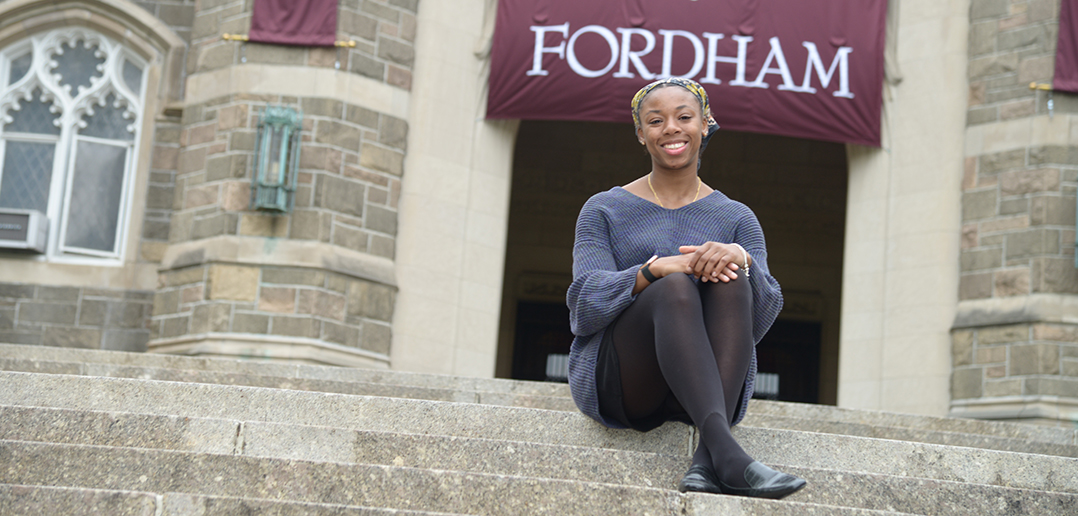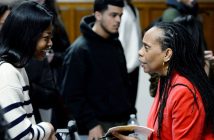On her arrival at Fordham College at Rose Hill, Sydni Britton made a beeline to the office of Ellen Watts, assistant dean for pre-health professions advising. Watts recalled that it was probably the first month of classes when the “very personable young woman” introduced herself.
“She told me about where she came from, what she hoped to do in her life, and her leadership experience,” recalled Watts.
As it turns out, each of those things played a large part in Britton’s Fordham career. On Saturday, in addition to graduating with a bachelor’s in biological sciences, Britton will also graduate with a bachelor’s in African and African American Studies. Next year, she will head off to Boston University in her hometown to get her master of science in medical programming before applying to med school. In her time at Fordham, she played violin in the orchestra; sat on the executive board of ASILI, the Black Student Alliance at Rose Hill; worked at FUEMS, the university’s emergency medical care organization; and served as a resident assistant.
She said two mentors, Dean Watts and Assistant Dean for Seniors Lisa Gill, Ph.D., helped her make it through what was at times a very difficult four years for any student, let alone a woman of color trying to advance in the sciences. Despite her drive, there were moments she didn’t live up to her own expectations.
“Sometimes, not reaching a goal is just part of being a person. You just have to bounce back. You can’t let it take you down,” said Britton.
Dean Gill said that Britton’s resilience is not unlike that of the rest of her classmates who spent only one year on campus after a global pandemic sent them home. And before they came back to campus for their senior year, the country had a nationwide reckoning with racism.
“This was a very untraditional college experience. Many students had to develop skills that they did not necessarily come into university life with. Then to have to come back with the culture shock of being seniors, as opposed to sophomores. They had to develop all kinds of skills in terms of being resilient, being adaptable,” said Gill. “Sydni exemplifies that, and not just strength in a traditional black-woman-are-strong kind of thing. She can see what’s happening around her and not get pulled under by all of the things that are happening.”
Still, Britton admitted was so “terrified” of doing badly that she nearly missed the point of doing science. But Watts helped her see the discipline as one in which mistakes are not just tolerated, they’re encouraged.
“Med schools look very close at the trend of how you do, not just the GPA,” Watts said. “They want a sense that you don’t fold. You don’t give up, you dug deeper, you found a way to identify more resources, you went and asked for help, which is the key.”
Britton said she began to learn how to fail forward.
“Science is a field where imperfection is valuable because getting something wrong also gives you information, so in the end, it’s hard to even make science into something that’s graded in a performance evaluation,” Britton said. “The nature of real science and real research is that failure’s okay, but within academia, it’s not okay.”
She further clarified that for her, and many other students of color, a lower grade is not simply something to feel badly about. For most of them, it’s a marker of the systemic racism that played out well before they stepped foot onto campus.
“The reality is that Black students disproportionately come from underperforming high schools,” she said, adding that most students from underperforming high schools do not have sufficient courses that bring them up to what’s expected at the college level. “[And] Fordham’s biology department is significantly more challenging than the average university science program.”
For her African and African American Studies thesis, Britton is writing about how the Black male collegiate experience has become commodified for purposes that are not always academic.
She added that over the past four years, the average American teen had begun to look for a more diverse campus experience, making it important for colleges to tout their diversity. But true diversity is not that simple, she said.
“There’s diversity around us all the time, but when you make it a point of selling it is when it becomes racialized,” she said.
“The cultural sentiment around Black students in the classroom is that they are here for a job, the school is giving them a handout, and they’re here to fulfill an image of diversity,” she said. “Every Black person comes to campus with a personal history with, personal relationships, with family backgrounds, so when talking about understanding Black people, it’s not about some monolithic quality that all Black people have. It’s about a monolithic system that Black people are put under that treats them as a singular entity.”
Similarly, if someone were to walk into a room full of white people, she said, they’d say it wasn’t diverse. “But we have no idea who is rich and who is poor. But for most people, when they think diversity, what clicks for them is racial and ethnic diversity.”
True diversity would look beyond the color of a person’s skin and take into consideration their socioeconomic background, education, politics, sexual identity, and much more, she said.
As Britton wraps up her time here at Fordham, she said both her majors utterly changed her perception of identity and race.
“Scientifically we’re all the same. All our bodies operate more or less in the same way,” she said.
She said she had to stop thinking about Blackness has some inherent quality.
“Blackness is constructed by society. But if I want to be a doctor, I need to understand what’s going on there. I have to get out of myself and start recognizing that it’s not because these people are Black that they have certain health issues,” she said. “It’s because they’re being oppressed. It has to do with larger ideas of economic depression, exploitation, and commodification. These are big theories and concepts that were superimposed on Black people for a very long time.”
She said that the University, and Jesuit institutions at large, are in a unique position to change that.
“I’m not saying that religion is a tool, but Jesuit institutions have a guide that goes beyond this world. They have the ability to reflect and meditate, because of their tradition and their discipline, that allows them to actually be able to fix these issues in a way that is lasting and significant. I mean, other universities don’t have that. That’s honestly how I feel. That’s what I believe.”



